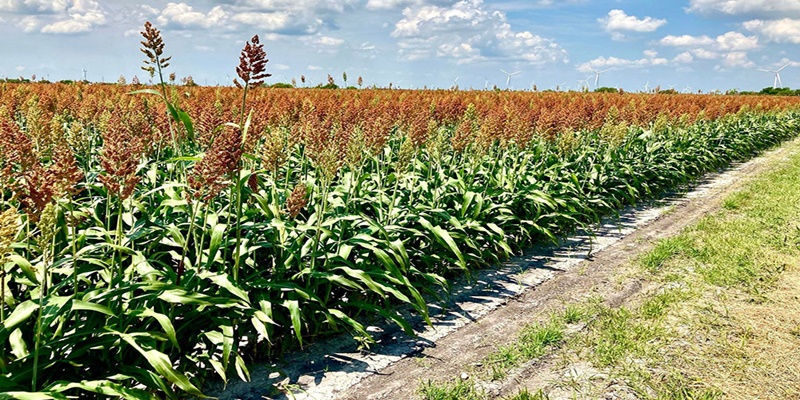Small Grains Are the Future

Rural women farmers in Zimbabwe have been described as key to preserving and conserving traditional seeds as food heritage.
Government, stakeholders and civic society organisations that included Sprout Women Empowerment Trust (SWET) and Women and Land in Zimbabwe recently held a breakfast meeting in Harare to discuss promotion of farmer managed seed systems and women as custodians of seeds.
Rural women farmers from districts across the country graced the event.
The women came from Chipinge, Makoni, Gokwe South, Makonde, Shurugwi, Gweru, Nkayi, Bubi, Gwanda and Hwedza.
Participants shared knowledge and exchanged notes on different traditional seeds grown in their areas and made recommendations to boost production.
Popular traditional grains grown include finger millet, sorghum, African rice, rapoko, round nuts, ground nuts, sunflower and cow peas, among others.
Speaking at the event, Clara Machokocho Ex- Situ Officer at the Zimbabwe National gene bank highlighted the importance of farmers in conserving traditional grain seeds popularly known as small grains “Mbeu ipfuma yematambidzanwa,” she said.
A farmer, said Machokocho is the custodian of the seed therefore should be responsible for conserving the same.
It is important to note that Zimbabwe has two seed systems, namely formal and informal seed systems.
Formal seed system is characterised by production and marketing of mainly certified hybrid and other genetically improved seeds.
The formal seed sector has seen large private seed companies dominate and enjoy the monopoly of the market.
It is a system that promotes commercialisation of agriculture thus hybrid seeds are promoted.
However, the informal seed system is characterised by seed saving, selection and circulation of seed in the informal market.
This system has been passed from generation to generation from the time our ancestors started practising agriculture.
It promotes value addition.
In Zimbabwe, just like in any other African country, women have assumed the role of custodians of traditional seeds due to their productive and reproductive roles which has put them at the core of food security.
The struggle for seed and food sovereignty in the country therefore needs supporting and enhancing traditional practices on seed preserving and conservation.
The history of traditional grain farming in Africa shows that there are a food heritages that fed generation after generation stretching back to the origins of mankind.
However, lack of support and commercialisation in agriculture led to the extinction of some traditional seeds and grain.
In most cases, the lost grains could not keep pace with foreign cereals.
The traditional grains faded away and remained principally as the ‘foods of the poor’ and rural areas.
Eventually they took the stigma of being called ‘small grains’.
As a result of rural to urban migration, traditional habits were replaced by Western-oriented diet and myths arose that the local grains were not a nutritious, high yielding and were less flavourful.
This led to some traditional seeds becoming extinct. They were replaced by grains from across the Atlantic such as maize.
But the so-called grains have proved resilient and thrive despite adverse conditions wrought by climate change.
Scientists, agronomists and environmentalists have cited an array of benefits associated with farming and consuming traditional grains.
“We cannot separate women and land and generations have been recycling traditional seeds because they are cheaper and convenient,” said Caroline Mutimbanyoka, director of SWET.
“One cannot talk about traditional grains without mentioning the health benefits associated with them.”
Mutimbanyoka also highlighted that despite their nutritional value, traditional seeds are popular for adapting to climate change and are considered drought tolerant.
Traditional seeds are not prone to diseases and can be preserved for a much longer period.
Thandiwe Chidavarume of Women and Land in Zimbabwe reiterated the need to support informal seed systems that reflect true African ways.
“In Africa we have a tendency of passing on the seed and 80 percent of that seed is still produced and distributed informally,” she said.
According to Chidavarume, the informal distribution of seeds show that traditional grain farmers are still in control of their seeds.
Considering the cost of modern seeds and their need for fertiliser application both SWET and Women and Land in Zimbabwe are advocating women farmers to have more choice with regards to the seeds they can grow and consume.
In other words, these civic organisations are advocating seed sovereignty that will allow farmers to have a choice of seed, save, exchange and sell their own produce.
However, there were calls for the rural women to balance between both the formal and informal seed systems.
Farmers also recommend the documentation of information relating to seed movement from a farmer to the gene bank and vice –versa for tracking purposes.
A legal policy framework was also recommended to ensure that rural farmers’ rights are supported. This will ensure the right of farmers to save, exchange and sell seed unrestricted.
The process of conservation of seeds starts from the household level to community seed bank then the national gene bank which then send them to the SADC Plant Genetic Resources Centre (SPGRC) in Lusaka Zambia.
Under household level, farmers can preserve seeds by placing them in a place free of moisture.
Some farmers suggested a method of adding salt inside storage containers which helps to keep the grain dry.
Sun drying of grains is another method that farmers can use in order to destroy pests and to reduce spoilage.
Courtesy: The Patriot
